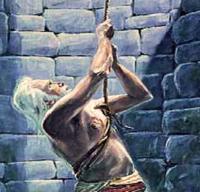
Jeremiah prophesied from 626 BC to 586 BC, mostly in Jerusalem. Like many people who speak against the status quo, he was often in trouble. The message from God was that Judah should not resist the Babylonians, as the help from Egypt would not be forthcoming. The leading men, however, did not want to submit, and accused Jeremiah of undermining the military. Zedekiah had been imposed on Judah by Nebuchadnezzar, King of Babylon, and did not have the support of the people. He was a weak man and felt powerless against the nobles. Jeremiah was thrown into a well, so that he would die a slow but bloodless death. However, he was helped by a foreigner, an Ethiopian, Ebed-melech.
Jesus, in the gospel, warned that his message would not bring peace. It is true that the message itself was one of peace; but in standing up against vested interests, as Jeremiah had done, he inevitably upset people. One example of division in a family arose when Edith Stein (later known as Sister Benedicta of the Cross), after a long journey searching for the truth, became a Christian. Her mother, a devout Jewess, found her daughter’s conversion very difficult to accept. Edith Stein’s journey of faith led her eventually to Auschwitz, where she died in the gas chamber.
We see quite clearly today that those who speak out against atrocities, flagrant breaches of international law and human rights are vilified, and false accusations are made against them. Jeremiah - and later Jesus - suffered similar fates.